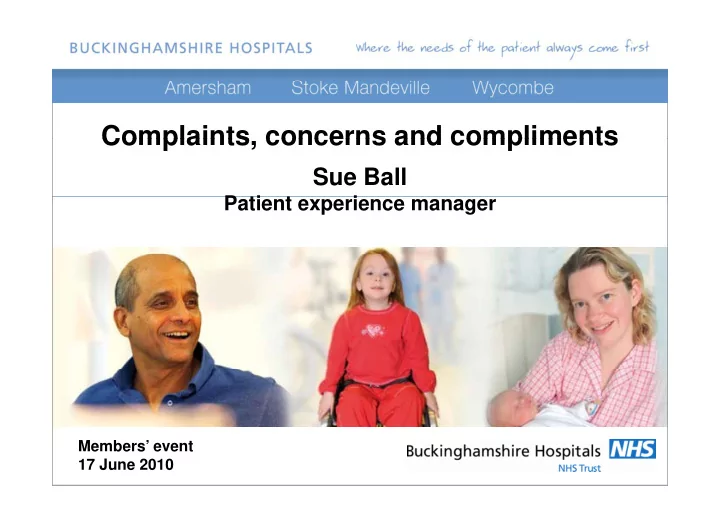

Complaints concerns and compliments Complaints, concerns and compliments Sue Ball P ti Patient experience manager t i Members’ event 17 June 2010
Background • NHS Constitution - patients have the right to have complaints dealt with efficiently, for complaint to be investigated fully, dealt with efficiently, for complaint to be investigated fully, receive an outcome and possible compensation • The new complaints regulations for Health and Social Care April 2009 - complaints handling to become more comprehensive, accessible and patient-focused • Accompanying guidance Listening, responding, improving: • Accompanying guidance ‘Listening responding improving: a guide to better customer care’ • Learning from complaints leads to improvements in our services g p p • Healthcare Ombudsman – principles of good complaint handling • Changes in the new regulations partially addressed
Current process • Trust handled 1500 concerns and complaints in 2009/10; 4000 compliments received in same time period 4000 compliments received in same time period • Patient Advice and Liaison Service (PALS) aims to resolve concerns raised by patients, carers and relatives as quickly as possible • Written complaints dealt with by complaints team – formal process of investigation with written response sent within 25 process of investigation with written response sent within 25 working days • Complaints and compliments recorded centrally by complaints p p y y p team • Formal reporting of complaints and PALS through our h healthcare governance committee to the Trust Board lth itt t th T t B d
Learning from complaints • Service redesign working with departments to review and streamline processes streamline processes • Service standards programme: includes DVD of patient stories • Amend or develop guidelines and protocols • Additional training where appropriate • Improved communication, eg proactively explaining to patients why clinics are running late
What is different? • New regulations cover social care as well as NHS complaints • If more than one organisation is involved a single coordinated • If more than one organisation is involved, a single coordinated response to be provided • Any concern not resolved in one working day required to be y g y q handled as a complaint • Complainants can ask for their complaint to be reviewed by the Parliamentary and Health Service Ombudsman th P li t d H lth S i O b d • Emphasis on better customer care, more flexibility and accessibility accessibility • Emphasis on learning from complaints to improve services
What do we need to do? • Resolve unwritten concerns within one working day where possible possible • Be responsive to complainant’s requirements with respect to responses and outcomes – what do they want? • Improve ways of accessing the Trust to raise a concern, comment, complaint or compliment • Increase and encourage learning from complaints, concerns, I d l i f l i t comments and feedback from across the whole Trust
Why review the policy? • In April 2010 Buckinghamshire Hospitals NHS Trust integrated with Community Health Buckinghamshire integrated with Community Health Buckinghamshire • Acknowledge that current policy and procedure do not fully address the changes within the new regulations • Recognise that the policy is part of a Trust-wide review of measuring the patient experience • Need to involve those working with the policy as well as the N d t i l th ki ith th li ll th complainants • Looking to obtain feedback on how we deal with complaints Looking to obtain feedback on how we deal with complaints already and what we could do better • Over to you!
Jane Bramwell Non executive director Non-executive director Members’ event 17 June 2010
Role of the non-executive director • Independently appointed by the Appointments Commission • Bring expertise and experience, and often particular B i ti d i d ft ti l knowledge as a member of the local community, to the work of the Board of the Board • Strategic and impartial focus – providing an independent view that is removed from the day-to-day running of the y y g organisation • No management or executive responsibilities g p • Available to provide support, advice and skills • Responsible for ensuring concerns and interests of the public p g p are included in decision-making • Monitor the performance and executive management of the organisation
Non-executive director’s role in complaints handling handling • Two non-executive director’s involved • Random selection of closed complaints reviewed on a R d l ti f l d l i t i d monthly basis (internal scrutiny) • Look at adherence to process Look at adherence to process • Look for any common themes or threads (in addition to what the complaints team have already identified) what the complaints team have already identified) • Feedback to patient experience manager and AD of healthcare governance healthcare governance • Sit on the healthcare governance committee
Recommend
More recommend